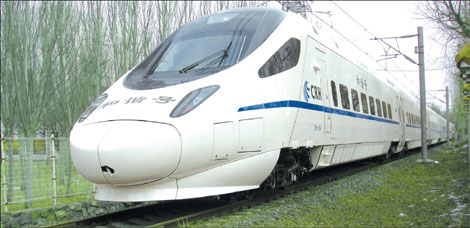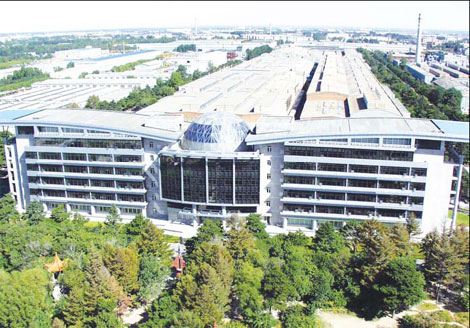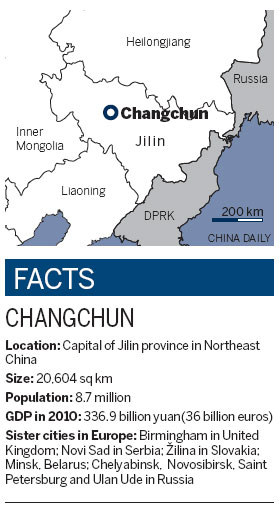Cars
On a roll
Updated: 2011-04-22 14:48
By Lu Chang and Liu Mingtai (China Daily European Weekly)
Auto hub Changchun also sets its sight on taking lead in railway sector
|
 A CRH high-speed rail train rolls off the production line in Changchun, Jilin province. The northeastern city plans to become a top rail transportation industry hub. Photos provided to China Daily |
With auto giants like Volkswagen, Toyota and China FAW (First Automotive Works) being made in it, Changchun is known as the Detroit of China. But the capital of northeastern Jilin province may soon take another lead in transportation - as the country's top high-speed train manufacturer. The city has set aside 51 square kilometers of land in its Luyuan Economic Development Zone, 3 km outside the city, to be developed as a global railway transportation industry and export base.
"A world's top rail transport manufacturing city should be a research and development, testing, manufacturing and maintenance base, and have a traditional culture of making railway vehicles," says Changchun Mayor Cui Jie during the annual national legislative meeting.
"And Changchun will qualify in all those aspects," he says.
Since the city authorities launched the project in 2007 with Changchun Railway Vehicles Co Ltd, a subsidiary of China Northern Locomotive and Rolling Stock Industry (Group) Corporation (CNR), more than 150 rail-related companies have shown their interest in moving into the manufacturing base.
With a total investment of 5.15 billion yuan (548 million euros), about 30 companies have signed the contract with the local government. These include ABB Datong Traction Transformers Co Ltd, a joint venture between ABB and Datong Electric Locomotive Co Ltd, Hitachi Yonge Electric Equipment (Xi'an) Co Ltd and Qingdao Victall Railway Group.
The companies, which will start production next year, will be settled in the railway industrial supporting zone to provide components, signaling systems and other railway-related equipment for the Changchun railway transport industry.
China CNR Corp's first-phase, 2.6 billion-yuan project establishing a high-speed Electronic Multiple Unit (EMU) manufacturing base is already in operation.
The CRH380 for the new Beijing-Shanghai high speed track rolled off production lines here. The cars that run more than 350 km an hour make the trip between the two cites in less than four hours, compared to a journey that took 19 hours just a decade ago.
"In light of the central government's support for rail expansion, Changchun's rail transportation equipment industry is set for a new dawn," says Cui Dianguo, CNR president.
"We are very proud of the high percentage of China's rail stock that has rolled off our production lines."

An aerial view of the Changchun Railway Vehicles Co Ltd, a subsidiary of CNR Corp, which supplies more than half of the domestic train market. |
Du Jian, vice-director of the Changchun Luyuan Economic Development Zone, says that with the completion of China's largest railway industrial park this year, the development zone will make 1,000 high-speed EMUs, 1,200 urban rail cars and 500 railway trains every year, with an annual output of 50 billion yuan.
CNR's production plant in Changchun already supplies more than half of the domestic railway train market. The company's products have been exported to more than 10 countries and regions including Brazil, New Zealand, Australia, Saudi Arabia, Argentina and Thailand.
Du says the manufacturing base is aimed at improving the production capacity and efficiency of high-speed rail trains, to meet growing demand from both domestic and overseas markets.
"As major Chinese cities are now competing to build new urban transit systems, there's a huge need for high-speed trains," Du says.
China embarked on the world's largest railway network expansion program in late 2008 when the world economic slowdown worsened.
As a national priority and a core component of the government's economic stimulus measures, railway investment is expected to peak in the coming two years, with annual investment between 2010 and 2012 reaching no less than 600 billion yuan, according to the Ministry of Railways.

By 2012, four years after the nation began its first high-speed passenger service, the country's high-speed rail track is set to reach 13,000 km, longer than the combined distance laid in the rest of the world.
At the end of 2010, the network was already the world's longest at 8,358 km, of which 5,149 km were put into service in 2010.
Apart from domestic development, China has also stepped up efforts to take a bigger slice of the global market, with the global railway infrastructure construction market entering another boom period.
Figures from the European Railway Industry Association (UNIFE) show that the annual value of the global rail market (excluding China) is estimated to be 120 billion euros.
China has also proposed a high-speed railway network linking the country and Southeast Asia, including a line traveling through Laos, Thailand and Malaysia to Singapore, a line to Myanmar, and another to Cambodia.
Earlier this year, China CNR Corp signed an agreement with Australian miner Fortescue Metals Group Ltd (FMG) to deliver the world's largest railway freight cars to Australia, advancing the high-end market, according to the State-owned Assets Supervision and Administration Commission.
CNR will deliver 260 40-ton-axle-load mining cars to FMG, Australia's third-largest iron ore miner. The carriers are considered the largest railway freight cars in terms of loading capacity.
At the same time, its major rival, China Southern Locomotive and Rolling Stock Industry Corp (CSR), another domestic high-speed train maker, is also spreading its wings overseas.
CSR signed letters of intent for ventures with General Electric Co (GE) which may bring in $1.4 billion (973 million euros) and add or preserve 2,000 US jobs, including an order for 500 exported locomotive kits and related services valued at $350 million.
CNR and CSR Corp are also in final negotiations for four deals worth $800 million with UK companies, marking a first for Chinese train producers to tap the Western European market.
Setting up a Changchun railway transportation industry base will offer a very successful and convincing model for Chinese railway equipment companies' overseas expansion, analysts say.
Ji Jialun, a professor of transportation at Beijing Jiaotong University, says such a railway industry park will bring about "good economy, good education, good medical care, better and longer life, all good things".
"Railways will play a bigger role after more high-speed lines are added to form a network," he says.
"Passengers will ultimately benefit from the competition offering more options."
Du Jian is confident that, due to its experience in this sector, Changchun, with its dedicated industrial base, research capabilities and managerial expertise in the field of rail equipment manufacturing, will make a mark in the same way the Detroit automotive area did in the United States during the heydays of the auto sector.
"The next time when people mention the high-speed railway hub, I think Changchun will be the first place that they think of," he says.
Specials

British Royal Wedding
Full coverage of the royal wedding of Prince William and Kate Middleton in London. Best wishes

The final frontier
Xinjiang is a mysterious land of extremes that never falls to fascinate.

Bridging the gap
Tsinghua University attracts a cohort of foreign students wanting to come to China.